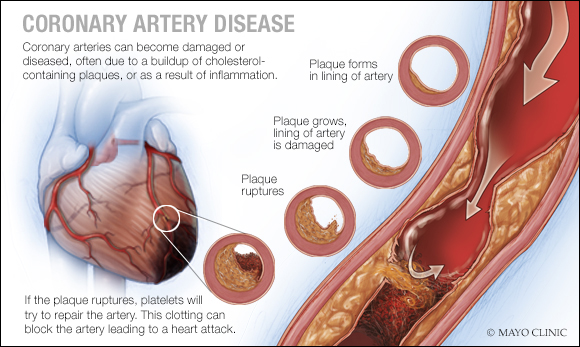-
Cardiovascular
Mayo Clinic Q and A: Coronary artery disease — prevention and early warning signs
 DEAR MAYO CLINIC: I'm a 52-year-old woman with a family history of coronary artery disease. I've seen what this disease can do to a person's health, and I really want to avoid it. Are there steps I should take now to prevent coronary artery disease? Are there early warning signs I should watch for?
DEAR MAYO CLINIC: I'm a 52-year-old woman with a family history of coronary artery disease. I've seen what this disease can do to a person's health, and I really want to avoid it. Are there steps I should take now to prevent coronary artery disease? Are there early warning signs I should watch for?
ANSWER: There are steps you can take to protect yourself from coronary artery disease, including making lifestyle choices that improve your heart health. Being aware of the symptoms of coronary artery disease is a good idea, too, so you can identify them quickly and report them to your health care provider right away.
Coronary artery disease happens when the major blood vessels that lead to your heart — your coronary arteries — become damaged or diseased, often due to a buildup of cholesterol-containing deposits, known as plaque, or as a result of inflammation.
Many factors can raise your risk for coronary artery disease, including family history. The risk tends to be highest if your father or a brother was diagnosed with the disease before age 55 or your mother or a sister developed it before age 65. Other risk factors include smoking, being overweight or obese, an unhealthy diet, lack of physical activity, high stress, high blood pressure, high blood cholesterol and diabetes.
As you consider ways to lower your risk, keep in mind that one of the most powerful drivers of heart health is maintaining a healthy weight. Excess weight often is a key contributor to diabetes, high blood pressure and high cholesterol.
To help control your weight, eat a healthy diet. Avoid fried, fatty foods; minimize excess sugar; and limit alcohol. Focus on eating vegetables and fruits, lean meats and whole grains. Be mindful of portion sizes and watch your calorie intake. In general, most healthy women need about 2,000 calories a day to maintain their weight, and men need about 2,500 calories a day. Not only does this type of diet help with weight management, it decreases the likelihood of plaque buildup in your arteries.
You also should exercise regularly. Aim for about 150 minutes a week of moderate physical activity. You don't have to go to a gym or do strenuous workouts to reap the benefits of exercise. For example, if you're just starting out, try taking a brisk walk for about 30 minutes most days of the week.
Another important way to protect yourself from coronary artery disease is not to smoke. People who smoke have a significantly higher risk of developing heart disease than those who do not smoke. Smoking not only affects smokers, but also it affects the people around them. Regular exposure to secondhand smoke also raises the risk of coronary artery disease.
If you have a health condition that raises your coronary artery disease risk, such as diabetes, it's important to keep that condition well-controlled. Follow your care plan closely, take medications as prescribed, and report any concerns or symptoms right away.
Early signs of coronary artery disease include frequently feeling fatigued; not being able to exercise as long or as hard as usual; and being short of breath even after mild exertion, such as taking a short walk or going up a flight of stairs. If you notice any of these signs, make an appointment to see your health care provider for an evaluation.
Symptoms that require immediate medical attention include pain, pressure or tightness in your chest; sudden shoulder, arm, neck or jaw pain; and shortness of breath or extreme fatigue without exertion. These symptoms could signal a heart attack. Women in particular may experience atypical symptoms, such as nausea, vomiting, fatigue, shortness of breath, or back or upper abdominal pain.
To better assess your risk of coronary artery disease, make an appointment to see your health care provider. Working together, the two of you can create a plan for minimizing that risk and find ways to preserve your heart health now and into the future. — Dr. Charanjit Rihal, Cardiovascular Diseases, Mayo Clinic, Rochester, Minnesota
****************************
Related Articles
- Mayo Clinic Minute: What is heart disease? published 11/1/18
- Women’s Wellness: Understanding heart disease in women published 1/25/18
- New blood test may predict cardiovascular events in patients with or without coronary artery disease published 3/9/17







